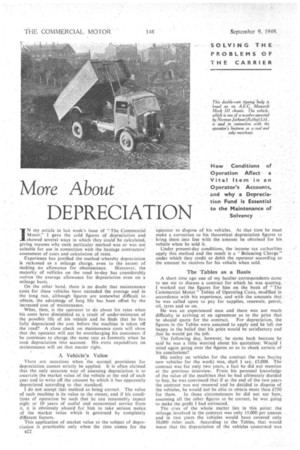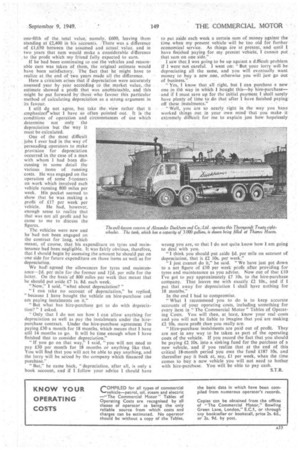More A bout
Page 56

Page 59

If you've noticed an error in this article please click here to report it so we can fix it.
DEPRECIATION
How Conditions of Operation Affect a Vita! Item in an Operator's Accounts, and why a Depreciation Fund is Essential to the Maintenance of
Solvency
IN my article in last week's issue of ":The Commercial Motor," I gave the cold figures of .depreciation and showed several ways in which they Could be calculated, giving reasons why each particular method was or was not suitable for use in connection With the haulage contractors' assessment of cots and calculation of rates.
Experience has justified the method .whereby depreciation is reckoned as a mileage charge, even to the extent of making no allowance for obsolescence.Moreover, the majority of vet-fides on the road to-day has considerably outrun the average allowance for depreciation even on a mileage basis.
On the other hand, there is no doubt that maintenance costs for these vehicles have exceeded the average and in the long run, although figures are somewhat difficult to obtain, the advantage of long life has been offset by the increased cost of maintenance.
What, then, is the operator to do about his rates when his costs have diminished as.a. result of under-estimates of the possible life of his vehicle and he finds that he has fully depreciated the cost before the machine is taken off the road? A Close check on maintenance costs will show that the operator will not be overcharging his customers if he continues to charge the same rate as formerly when he took depreciation into account. His extra expenditure on maintenance will set that matter right.
A Vehicle's Value
There are occasions when the normal provisions for depreciation cannot strictly be applied. It is often claimed. that the only accurate way of assessing depreciation is to ascertain the market value of the vehicle at the end of each year and to write off the amount by whichit has apparently depreciated according to that standard.
I do not accept that method as being correct. The value of each machine is its value to the owner, and if his conditions of operation be such that he can reasonably 'expect eight or 10 years of useful and economical service from it, it is obviously absurd .for him to take serious notice of the market value which is governed by completely different factors.
This application of market value to the subject of depreciation is practicable only when the time comes for the B22 operator to dispose of his vehicles. At that time he must make a correction to his theoretical depreciation figures to bring them into line with the amount he obtained for his vehicle when he sold it.
Under present-day conditions, the income tax authorities apply this method and the result is a " Balancing Charge" under which they credit or debit the operator according to the amount he receives for his vehicle when sold.
The 'Tablesas a Basis
A short time ago one of my haulier correspondents came to see me to discuss a contract for which he was quoting. I worked out the figures for him on the basis of "The Commercial Motor " Tables of Operating Costs, modified in accordance with his experience, and with the amounts that he was called upon to pay for supplies, renewals, petrol, oil, tyres and so on.
He was an experienced man and there was not much difficulty in arriving at an agreement as to the price that he should quote for the contract. For depreciation, the figures in the Tables were assumed to apply and he left mo happy in the belief that his price would be satisfactory and that he would get the job.
The following day, however, he came back because he said be was a little worried about his quotation: Would' mind again going over the figures so as to check certain of his conclusions?
His outlay on vehicles for the contract (he was buyine new vehicles for the work) was, shall I say, £3,000. The contract was for only two years, a fact he did not mention at the previous interview. From his personal knowledge of the value of the machines that he had ultimately decided to buy, he was convinced that if at the end of the two years the contract was not renewed and he decided to dispose of the vehicles, he would not be able to obtain more than £750 for them. In those circumstances he did not see how, assuming all the other figures to be correct, he was going to make the prOfit i had estimated.
The crux of the whole matter lies in this point: the mileage involved in the contract was only 15,000 per annum and in two years the vehicles would have covered only 30,000 miles each According to the Tables, that would mean that the depreciation of the vehicles concerned was
one-fifth Of the, total value; namely, €600, leaving them standing at £2,400 in his aecounts. There was a difference of £1,650 between the aSstimed and actual value. and in two years that turn would make a considerable difference to the profit which my friend fully. expected to earn.
If he had been continuing to use the vehicles and reasonable care was taken Of them, the original estimate would have been satisfactory: The fact that he might have to realize at the end of two years made all the difference.
Here a criticism arises that if depreciation were accurately assessed year by year according to the market value, the estimate showed a profit that was unobtainable, and this might be put forward by those who favour this particular method of calculating depreciation as a strong argument in its favour.
I still do not agree, but take theview rather that it emphasizeg'what. I have so often pointed out It is the conditions of operation and circumstances of use which determine not only the depreciation but the way it must be calculated.
One of the Most diffictilt jobs I ever had in the way of persuading operators to make provision for depreciation occurred in the case of a man with whom I had been dis cussing in some detail the various items of running costs. He was engaged on the operation of some 5-tonners on work which involved each vehicle running 800 miles per week. His pocket seemed to show that he was making a profit of £17 per week per vehicle. He had, however, enough sense to realize that that was not all profit and he came to me to discuss the figures.
The vehicles were new and he had not been engaged on the contract for long, which meant, of course, that his expenditure on tyres and maintenance had been negligible. It Was fairly obvious, therefore, that I should begin by assessing the amount he should put on one side for future expenditure on those items as well as for depreciation.
We ha & agreed the allowances for tyres and maintertance—id. per mile for the former and I gcl. per mile for the latter. On the basis' of 800 miles per week that meant that he should put aside £7 is. 8d. each week.
"Now," I said, "what about depreciation? "
" can take no account of depreciation," he replied, " because I have bought the vehicle on hire-purchase and am paying instalments on it."
" But what has hire-purchase got to do with depreciation?" I asked.
"Only that I do not see how I can allow anything for depreciation as well as pay the instalments under the hirepurchase contract. Under the hire-purchase agreement I'm paying £30 a month for 18 months, which means that I have still 14 months to go. It will be lime enough when I have finished that to consider depreciation."
"If you go on that way," I said, "you will not need to pay £30 per month for 18 months or anything like that. You will find that you will not be able to pay anything, and the lorry will be seized by the company which financed the purchase."
"But," he came back, "depreciation, after all, is only a book account, and if I follow your advice I should have to put aside each week a certain sum of money against the time when my present vehiclewill be too old for further economical service. AS things are at present, and until have finished paying for my present vehicle, I cannot put that sum on one side." I saw that! was going to he up against a d,fficult problem if I were-not careful. I went on: But your lorry depreciating all the same, and you will eventually want money to buy a new :one, otherwise you will just-go out
of business."
Yes, I know that all right, but I cart purchase a new • one in t.M way in which I bought this—by hire-purchaseand if I must save up for the initial payment I shall surely have plenty of time to do that after I have finished paying off these instalments."
"Well, you are so nearly right in the way you have worked things out in your own mind that you make it extremely difficult for me to explain just how hopelessly
wrong you are, so that T do not quite know how I am going to deal with you.
"I think you should put aside id. per mile on account of depreciation, that is £2 10s. per week."
" I just cannot do it," he said. "We have just got down to a net figure of £10 per week profit after providing for tyres and maintenance as you advise. Now out of that €10 I've got to pay approximately £7 10s. to the hire-purchase company. That leaves me with exactly £2 10s., and if I put that away for depreciation I shall have nothing for 18 months."
In the end I had to compromise.
"What I recommend you to do is to keep accurate accounts of your operating costs, including something for every item in "The Commercial Motor" Tables of Operating Costs. You will then, at least, know your real costs and you will not be liable to imagine that you are making £.2 10s. more profit than you really are. "Hire-purchase instalments are paid out of profit. They are not in any way to be taken as part of the operating costs of the vehicle. If you record the fact that you should be paying £2 10s. into a sinking fund for the purchase of a new vehicle, and if you realize that at the end of this critical 18-month period you owe the fund £187 10s. and thereafter pay it back at, say, LI per week, when the time comes to buy a -new vehicle you will not need to bother with hire-purchase. You will be able to pay cash. S.T.R.




























































































